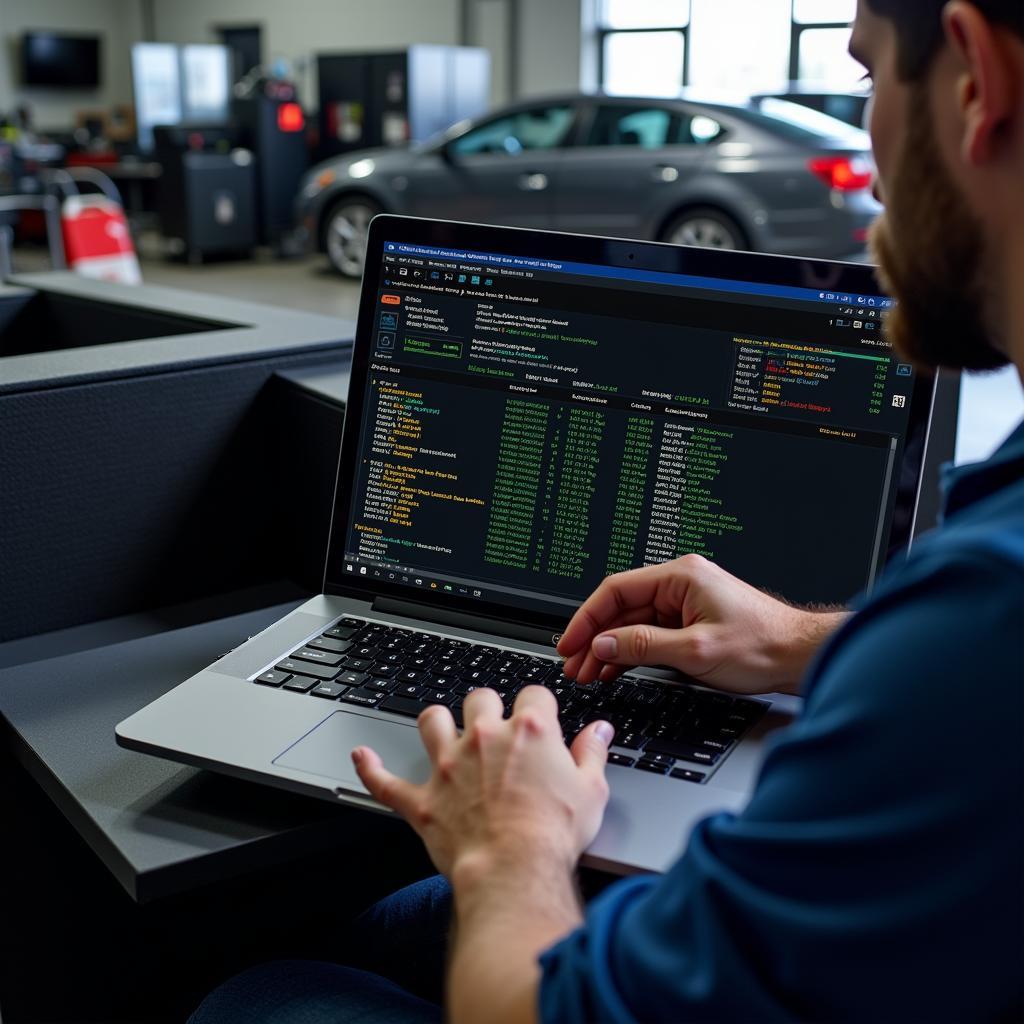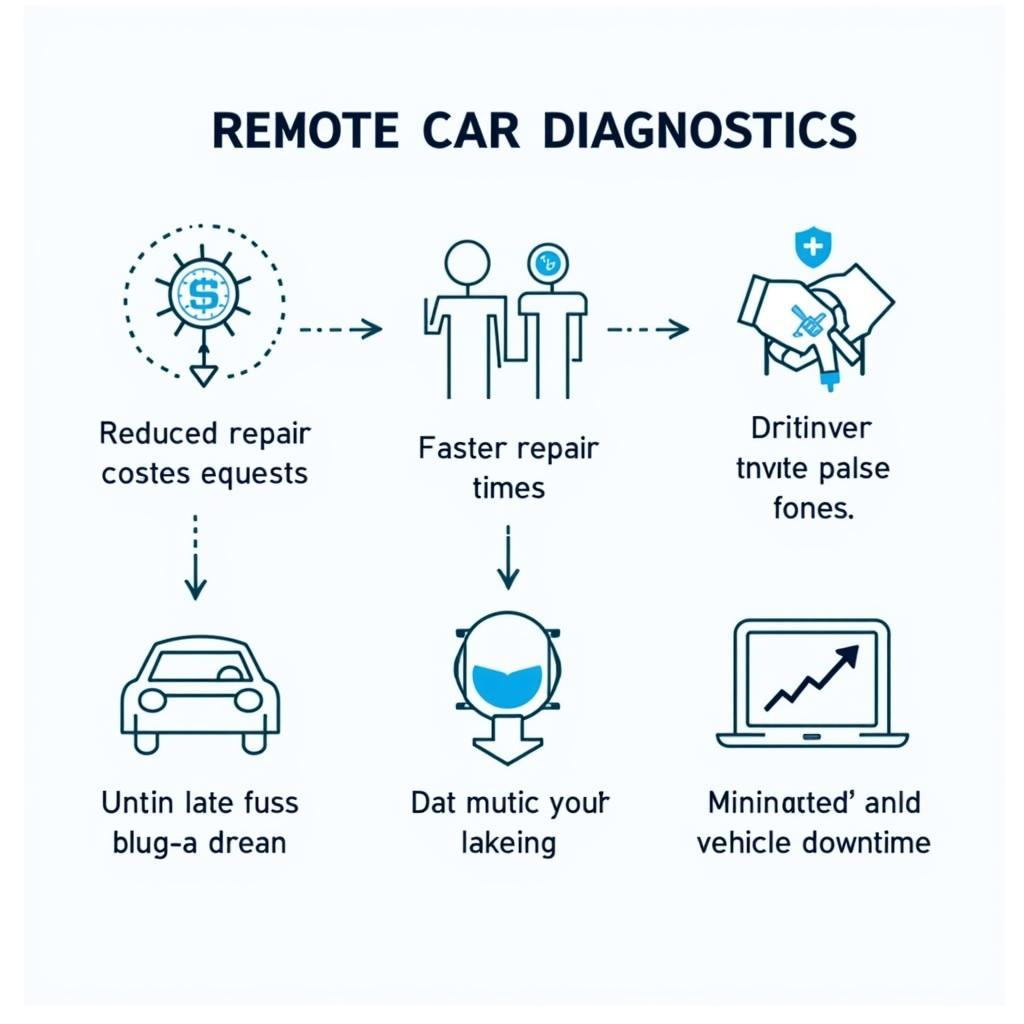Remote Car Diagnostics is rapidly changing how we identify and fix car problems. This cutting-edge technology allows mechanics and car owners to remotely diagnose issues, eliminating the need for a trip to the mechanic for a simple check engine light.
 Mechanic using remote car diagnostics
Mechanic using remote car diagnostics
How Does Remote Car Diagnostics Work?
Remote car diagnostics relies on a vehicle’s onboard diagnostic system (OBD) and a telematics device. The OBD system continuously monitors various vehicle components and systems, recording data and flagging any malfunctions. The telematics device, often plugged into the OBD-II port, acts as a bridge between the vehicle’s computer and a remote server.
When a car experiences a problem, the telematics device transmits the diagnostic data wirelessly to a secure server. This data is then accessible to mechanics or car owners through a web-based platform or a dedicated app.
Advantages of Using Remote Car Diagnostics
The benefits of remote car diagnostics extend beyond mere convenience:
- Early Problem Detection: Remote diagnostics can identify minor issues before they escalate into major, costly repairs.
- Faster Repairs: Mechanics can access the diagnostic data in real-time, allowing for quicker diagnosis and repair strategies.
- Reduced Downtime: Identifying issues remotely minimizes the time a vehicle spends in the shop.
- Cost Savings: Early detection and faster repairs translate to lower overall repair costs.
- Enhanced Convenience: [Handheld diagnostic device for cars for sale] offer car owners the flexibility to diagnose their vehicles from any location.
 Visual representation of the benefits of remote car diagnostics
Visual representation of the benefits of remote car diagnostics
Applications of Remote Car Diagnostics
The applications of remote car diagnostics are wide-ranging:
- Predictive Maintenance: Mechanics can leverage real-time data to anticipate potential issues and perform proactive maintenance, preventing unexpected breakdowns.
- Fleet Management: Fleet managers can remotely monitor the health of their vehicles, optimize maintenance schedules, and minimize downtime.
- Insurance Telematics: Insurance companies can use remote diagnostics data to assess driving behavior and personalize insurance premiums.
- Used Car Inspections: Potential buyers can gain valuable insights into a used car’s mechanical history and potential issues.
“Remote car diagnostics allows us to be more proactive in our approach to vehicle maintenance,” says John Smith, a senior automotive engineer at a leading car manufacturer. “We can now identify potential problems before they become major issues, saving our customers time and money.”
[car diagnostics explained] in detail can be found on our website.
Choosing the Right Remote Car Diagnostic Tool
When selecting a remote car diagnostic tool, consider the following:
- Vehicle Compatibility: Ensure the tool is compatible with your vehicle’s make, model, and year.
- Features and Functionality: Determine the specific features you require, such as real-time data streaming, diagnostic trouble code reading, and historical data logging.
- User Interface: Opt for a tool with an intuitive and easy-to-navigate user interface.
- Data Security: Verify the tool employs robust security measures to safeguard your vehicle’s data.
[alfa romeo car diagnostic tool that can clear abs lights] might be a suitable option if you are an Alfa Romeo owner.
The Future of Remote Car Diagnostics
As technology continues to advance, the future of remote car diagnostics appears bright. We can anticipate:
- Increased Integration: Seamless integration with other vehicle systems, such as infotainment and navigation.
- Artificial Intelligence (AI): AI-powered diagnostics to provide more accurate and detailed problem analysis.
- Over-the-Air (OTA) Updates: Wireless updates to enhance tool functionality and address emerging issues.
[car diagnostic codes pdf] can be a handy resource for understanding these codes.
Conclusion
Remote car diagnostics is transforming the automotive industry, offering numerous benefits for both car owners and mechanics. By providing real-time insights into a vehicle’s health, this technology allows for early problem detection, faster repairs, and ultimately, a more streamlined and cost-effective car ownership experience. As technology continues to evolve, remote car diagnostics will play an even more pivotal role in the future of vehicle maintenance and repair.
FAQs
-
What is the difference between remote car diagnostics and onboard diagnostics?
Onboard diagnostics (OBD) refers to the system within your car that monitors various components. Remote car diagnostics utilizes the data collected by the OBD system but transmits it wirelessly, allowing for remote access and analysis. -
Can I use remote car diagnostics to fix my car myself?
While remote car diagnostics can help you understand the problem, it’s generally recommended to consult a qualified mechanic for repairs. -
Is my vehicle data secure during remote diagnostics?
Reputable remote car diagnostic tools employ robust security measures to protect your vehicle’s data during transmission and storage. -
Do I need a special device for remote car diagnostics?
Yes, a telematics device that plugs into your vehicle’s OBD-II port is typically required for remote car diagnostics. -
How accurate are remote car diagnostics?
Remote car diagnostics can be highly accurate in identifying and diagnosing car problems, especially when used with advanced tools and experienced professionals.
For finding the [vauxhall carlton where is the diagnostic plug on the car] you can visit our blog.
Need help with car diagnostics? Contact us on WhatsApp: +1(641)206-8880 or Email: [email protected]. We offer 24/7 support.

Leave a Reply